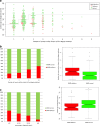Hereditary colorectal cancer diagnostics in southern Sweden: retrospective evaluation and future considerations with emphasis on Lynch syndrome
- PMID: 30251116
- PMCID: PMC6435770
- DOI: 10.1007/s12687-018-0385-1
Hereditary colorectal cancer diagnostics in southern Sweden: retrospective evaluation and future considerations with emphasis on Lynch syndrome
Abstract
Overlapping phenotypes between different hereditary colorectal cancer (CRC) syndromes together with a growing demand for cancer genetic testing and improved sequencing technology call for adjusted patient selection and adapted diagnostic routines. Here we present a retrospective evaluation of family history of cancer, laboratory diagnostic procedure, and outcome for 372 patients tested for Lynch syndrome (LS), i.e., the single most common hereditary cause of CRC. Based on number of affected family members and age at cancer diagnosis in families with genetically confirmed LS, we developed local patient selection criteria for a simplified one-step gene panel mutation screening strategy targeting also less common Mendelian CRC syndromes. Pros and cons of this strategy are discussed.
Keywords: Cancer; Colorectal; Gene panel; Hereditary; Screening.
Conflict of interest statement
Conflict of interest
The authors declare no conflicts of interest.
Ethical approval
This study constitutes a retrospective evaluation of clinical data and was part of a quality assessment project at the Department of Clinical Genetics in Lund. Informed written consent for cancer genetic investigation was collected from each proband as part of the clinical routine.
Figures



Similar articles
-
[Management of hereditary non-polyposis syndrome (Lynch syndrome)].Harefuah. 2011 Apr;150(4):392-6, 416. Harefuah. 2011. PMID: 22164924 Hebrew.
-
Assessment of Tumor Sequencing as a Replacement for Lynch Syndrome Screening and Current Molecular Tests for Patients With Colorectal Cancer.JAMA Oncol. 2018 Jun 1;4(6):806-813. doi: 10.1001/jamaoncol.2018.0104. JAMA Oncol. 2018. PMID: 29596542 Free PMC article.
-
Universal Screening of Colorectal Cancers for Lynch Syndrome: Challenges and Opportunities.Dig Dis Sci. 2016 Apr;61(4):969-76. doi: 10.1007/s10620-015-3964-6. Epub 2015 Nov 24. Dig Dis Sci. 2016. PMID: 26602911 Review.
-
Comparison of Molecular, Clinicopathological, and Pedigree Differences Between Lynch-Like and Lynch Syndromes.Front Genet. 2020 Aug 19;11:991. doi: 10.3389/fgene.2020.00991. eCollection 2020. Front Genet. 2020. PMID: 32973888 Free PMC article.
-
Lynch syndrome and Lynch syndrome mimics: The growing complex landscape of hereditary colon cancer.World J Gastroenterol. 2015 Aug 21;21(31):9253-61. doi: 10.3748/wjg.v21.i31.9253. World J Gastroenterol. 2015. PMID: 26309352 Free PMC article. Review.
Cited by
-
Merged testing for colorectal cancer syndromes and re-evaluation of genetic variants improve diagnostic yield: Results from a nationwide prospective cohort.Genes Chromosomes Cancer. 2022 Oct;61(10):585-591. doi: 10.1002/gcc.23049. Epub 2022 May 2. Genes Chromosomes Cancer. 2022. PMID: 35430768 Free PMC article.
References
-
- Baglietto L, Lindor NM, Dowty JG, White DM, Wagner A, Gomez Garcia EB, Vriends AH, G. Dutch Lynch Syndrome Study. Cartwright NR, Barnetson RA, Farrington SM, Tenesa A, Hampel H, Buchanan D, Arnold S, Young J, Walsh MD, Jass J, Macrae F, Antill Y, Winship IM, Giles GG, Goldblatt J, Parry S, Suthers G, Leggett B, Butz M, Aronson M, Poynter JN, Baron JA, Le Marchand L, Haile R, Gallinger S, Hopper JL, Potter J, de la Chapelle A, Vasen HF, Dunlop MG, Thibodeau SN, Jenkins MA. Risks of lynch syndrome cancers for MSH6 mutation carriers. J Natl Cancer Inst. 2010;102(3):193–201. doi: 10.1093/jnci/djp473. - DOI - PMC - PubMed
-
- Bapat B, Lindor NM, Baron J, Siegmund K, Li L, Zheng Y, Haile R, Gallinger S, Jass JR, Young JP, Cotterchio M, Jenkins M, Grove J, Casey G, Thibodeau SN, Bishop DT, Hopper JL, Ahnen D, Newcomb PA, Le Marchand L, Potter JD, Seminara D, R. Colon Cancer Family The association of tumor microsatellite instability phenotype with family history of colorectal cancer. Cancer Epidemiol Biomark Prev. 2009;18(3):967–975. doi: 10.1158/1055-9965.EPI-08-0878. - DOI - PMC - PubMed
-
- Boland CR, Thibodeau SN, Hamilton SR, Sidransky D, Eshleman JR, Burt RW, Meltzer SJ, Rodriguez-Bigas MA, Fodde R, Ranzani GN, Srivastava S. A National Cancer Institute workshop on microsatellite instability for cancer detection and familial predisposition: development of international criteria for the determination of microsatellite instability in colorectal cancer. Cancer Res. 1998;58(22):5248–5257. - PubMed
LinkOut - more resources
Full Text Sources
Other Literature Sources
Miscellaneous

